BEIJING — Chinese tech company Baidu and auto manufacturer Geely are putting more money into the electric car venture Jidu that they partnered on just about a year ago.
Both companies announced Wednesday they are putting nearly $400 million into Jidu in a Series A financing round. The capital injection comes less than a year after Jidu was launched in March 2021 with $300 million in initial capital from undisclosed investors.
Baidu has majority ownership of Jidu, with a 55% share of the company, while Geely has a 45% stake, according to records accessed through Wind Information. Both companies declined to share how much each contributed to the latest funding round.
The money will fund research and development and mass production, according to Jidu.
Global dealmaking in electric vehicles has surged in the last two years as companies rush to develop cars that analysts expect will soon replace combustion-engine ones. The Chinese government has been particularly supportive of the domestic industry’s growth, helping spur the rise of many start-ups.
Electric vehicle deals in China tripled in value to $6.61 billion in 2021 from $2.17 billion in 2020, according to Dealogic. Electric vehicle deals in the U.S. more than doubled to $924 million last year from $353 million in value in 2020, the data showed.
Baidu announced in January 2021 it planned to launch Jidu with Geely as a strategic partner and later named Xia Yiping, co-founder of bike sharing start-up Mobike, as CEO of the electric car company.
In 2010, China-based Geely acquired Swedish auto brand Volvo, which previously belonged to Ford Motor.
Geely operates a number of electric vehicle brands — on its own or through joint ventures with Volvo — from Zeekr to the high-end Polestar.
In the last several weeks, Baidu has announced that Jidu plans to reveal a concept car with level 4 autonomous driving capabilities at the auto show in Beijing, set for April.
Jidu’s first car is set to begin mass production and deliveries in 2023, according to Baidu.
Baidu’s venture into electric vehicles is part of CEO Robin Li’s push to diversify the company’s business away from advertising into new growth areas including autonomous driving and artificial intelligence.
In China, there is a bigger trend of technology companies jumping into the electric vehicle space. Last year, Xiaomi announced plans to invest $10 billion over the next 10 years into its own electric car business and expects to mass produce its own vehicles in the first half of 2024. Telecommunications giant Huawei meanwhile has been partnering with automakers on areas including in-car software and autonomous driving.
– Additional reported by CNBC’s Arjun Kharpal.
